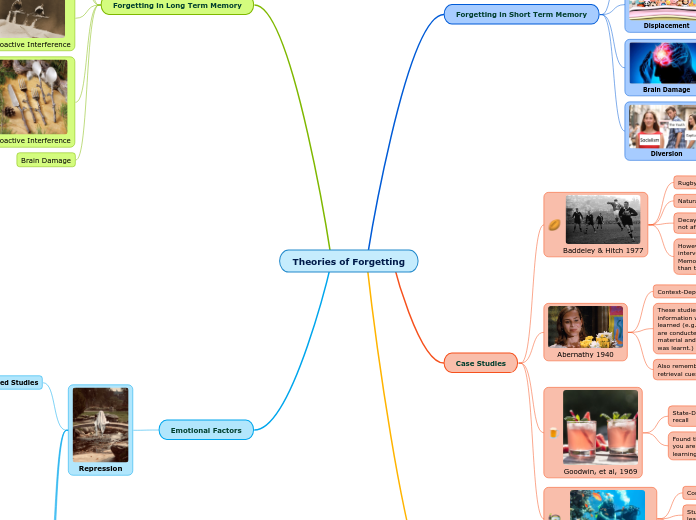Theories of Forgetting
Forgetting in Short Term Memory

Trace Decay
Memory lost to the passage of time
Peterson & Peterson 1959 found that memory
held in STM was lost after approximately 18
seconds due to trace decay
Hebb 1949 - a brief and fragile memory trace is
laid down and without rehearsal that memory
is lost. Rehearsal is repeated neural activity which
allows memory to be transferred a the Long
Term Memory Stiore

Displacement
Limited number of space/slots in Short Term Memory (7 +/- 2)
so old information is displaced.
Brown-Peterson technique: last few words on list displaced by counting task.

Brain Damage
Warrington & Sahllice 1972 Study of KF found that in Short Term Memory audio letters/digits were more easily forgotten than visual stimuli. This suggests Short Term Memory has miltiple stores.

Diversion
The less attention focused on information, the more likely it is to be forgotten.
Case Studies

Baddeley & Hitch 1977
Rugby Players. Long Term Memory
Natural experiment on decay and interference
Decay theory assumed that the passage of time would not affect the recollection of information
However, results were varied, therefore can conclude that intervening memories interrupted encoding in Long Term Memory and interference has greater impact on decay than the passage of time

Abernathy 1940
Context-Dependant Forgetting
These studies showed that it is easier to recall information within the same context in which it was learned (e.g. students perform better on tests when they are conducted by the same teacher who taught them the material and in the same room in which that material was learnt.)
Also remembering information is made easier with retrieval cues

Goodwin, et al, 1969
State-Dependant Forgetting / The effects of alcohol on recall
Found that it is more likely to remember information if you are in the same emotional or physical state when learning it

Godden & Baddeley 1975
Context-Dependant Forgetting
Study involved divers and the effects of recall when learning and recall environment are the same?different
Results concluded that retrieval of information was best when learning and recall environments were the same
Disorders that affect Memory
Alzheimer's
Dementia
Huntington's Disease
Parkinson's Disease
Schizophrenia
Forgetting in Long Term Memory

Trace Decay
This decay happens due to disuse. Knowledge and skills fade.

Lack of Consolidation
A period of firmly making the memory stronger is necessary for recording memory into Long Term Memory
An injury to the head may prevent consolidation

Retroactive Interference
This is when new information interferes with the recall of old information
Various studies from the 60's concerned a paired association technique. Results found participants were more likely to remember the associated word from the other list rather than the prompt word to begin with.

Proactive Interference
This is when old information interferes with the recall of new information
e.g. a moved cutlery drawer in a kitchen
Brain Damage
Emotional Factors

Repression
Related Studies
Brewin & Andrews, 2000
Study supports 'intentional forgetting'
Myers & Brewin, 1994
Study suggests is more likely to be a result of a troubled childhood

Levinger & Clark 1961
Investigated the retrieval of association to words that were emotionally charged and compared them to the retrieval of of associations to neutrally charged words
Results: Participants took longer to provide associations the the negatively charged words than to the neutral. Negative words also produced a higher galvanic skin responses

Loftus & Pickrell, 1995
Investigated the formation of false memories by asking participants to retrieve information about memories their older relatives had written in a booklet. One memory was falsified - of getting lost in a shopping mall.
Results: 25-29% claimed to 'remember' false event.

Loftus & Burns, 1982
Investigated the effects of retrieval of information from a bank robbery video, with two versions of the video.
Results: participants had poorer recall for the more violent video
Loftus & Burns concluded that this was due to "weapons focus": when attention is channeled towards the source of distress and away from other details. They also suggested participants could have needed to be in the same state to improve recall (cue-dependant).
Psychodynamic theory
Defence Mechanism
Develops from a fixation in childhood to reduce anxiety in adulthood
Is unconscious (the ego blocks the retireval of memories)
